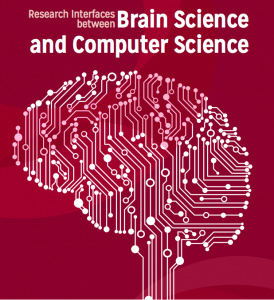Contributions to this post were made by Gregory Hager, Chair of the Computing Community Consortium (CCC) and Professor and Chair of Computer Science at Johns Hopkins University.
Early pioneers of computing such as Alan Turing, John Von Neuman and Herb Simon were fascinated by the possibility of computing opening a window into our understanding of the brain, and how understanding the brain might advance computing. A half century later, computing has made extraordinary progress, but much of the inner workings of the brain remain a mystery. Can we re-ignite the early promise of synergy between research on the human brain and computer science to the benefit of both fields?
This was the theme of a recent workshop on Research Interfaces between Brain Science and Computer Science sponsored by the Computing Community Consortium (CCC) and the National Science Foundation (NSF). The purpose of the workshop was to bring together computer scientists and neuroscientists to help create breakthrough technologies for President Obama’s BRAIN Initiative.
Over 70 computer scientists and neuroscientists from academia, industry, and government were in attendance and between 160-300 participants viewed each panel and plenary on the live-stream. The diversity of the participants made for animated discussions in person as well as on a live twitter feed (#cccbrain). It is a “hot” topic that is gaining even more interest with NSF’s recent Integrative Strategies for Understanding Neural and Cognitive Systems (NSF-NCS) solicitation.
The workshop had four plenary speakers, Aude Oliva, Jack Gallant, Leslie Valiant, and Terrence Sejnowski. The topics covered include deep architectures in neural systems, fMRI data, and models of computation. Speakers and participants were invited to think about “grand predictions” inspired by these talks, much as Turing, Von Neuman, and Simon made many predictions for CS in its formative years. In response, Jack Gallant opined:
Some time in the near future we should be able to decode internal speech, your inner voice, which can then be read back to you from a speaker using fMRI responses.
The real success of the workshop came from the four panels (Imaging and Brain Mapping, Brain and Body, Computing, and Data) and the conversations that they sparked. Panelists had their ideas enriched and challenged by neuroscientists and computer scientists alike.
In the Brain Mapping panel, Jeff Lichtman articulated how the landscape of neuroscience has changed by noting:
Thirty years ago neuroscientists were brimming with big ideas and there was little data to stand in the way of espousing these views. Now we have the opposite dilemma: ever increasing mountains of big data but it is hard to find big ideas that encompass the massive amounts of information neuroscience research is accumulating. Hence we are transitioning perhaps from an era of “understanding” to an era of “information.
Later Sean Hill, raised a similar point:
How much information do we need to measure before we can reliably make predictions? That is, do we really need all the information across the entire brain, down to the smallest nanometer, in order to detect regularities that are meaningful?
A counterpoint to this idea was brought up, can we develop an algorithmic representation of the brain from all of the anatomical information or from all of the functional information? If we have one, can we more or less ignore the other? In short, if we know “the architecture,” can we infer function, or conversely, if we can measure function, do we need to know the architecture?
If one thing was clear at the end of the workshop, it was that there were many opportunities for CS research to impact and influence brain research. This workshop started conservations, but this is just the beginning of hopefully many future collaborations between the two disciplines.
The workshop panels and plenary talks were recorded and will be posted along with the presentations on the workshop website in the coming weeks. A workshop report will be forthcoming early next year.











Trackbacks /
Pingbacks